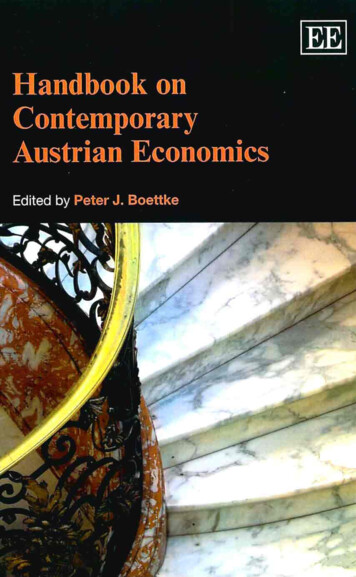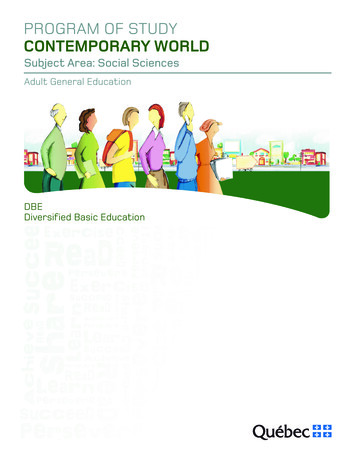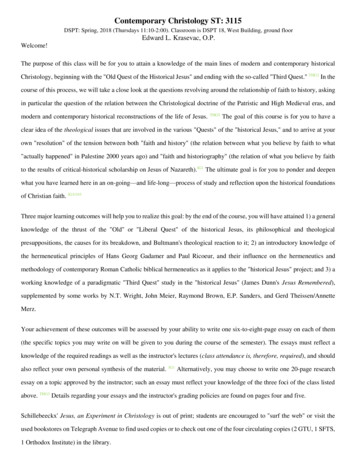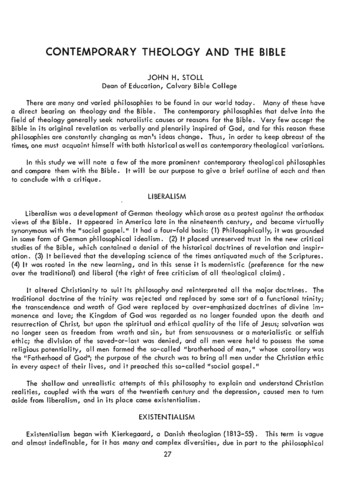
Transcription
HANDBOOK ON CONTEMPORARYAUSTRIAN ECONOMICS
In memory of my two teachers in Austrian Economics:Hans Sennholz (1922- 2007) and Don Lavoie (1951 - 2001)
Handbook on ContemporaryAustrian EconomicsEdited byPeter J. BoettkeGeorge Mason University, Virginia, USAEdward ElgarCheltenham, UK Northampton, MA, USA
Peter J. Boettke 2010All rights reserved. No part of this publication may be reproduced, storedin a retrieval system or transmitted in any form or by any means, electronic,mechanical or photocopying, recording, or otherwise without the priorpermission of the publisher.Published byEdward Elgar Publishing LimitedThe Lypiatts15 Lansdown RoadCheltenhamGlos GLSO 2JAUKEdward Elgar Publishing, Inc.William Pratt House9 Dewey CourtNorthamptonMassachusetts 01060USAA catalogue record for this bookis available from the British LibraryLibrary of Congress Control Number: 2009941412!;jFSCMixed SourcesProduct group from well·ma gedforests nd other controlled sourceswww.fsc.orgCertno. SA-(OC-156So 1996 Forest Sttw.-dsJYp CouncilISBN 978 I 84720411 0 (cased)Printed and bound by MPG Books Group, UK
ContentsList of contributorsIntroduction by Peter J. BoettkeVllXlPART I THE SCIENCE OF ECONOMICSOnly individuals chooseAnthony J. Evans2 Economics as the study of coordination and exchangeChristopher J. Coyne3 The facts of the social sciences are what people believe andthinkVirgil Henry StorrPART II1430MICROECONOMICS4 Economic value and costs are subjectiveEdward P. Stringham5 Price: the ultimate heuristicStephen C. Miller6 Without private property, there can be no rational economiccalculationScott A. Beaulier7 The competitive market is a process of entrepreneurialdiscoveryFrederic SautetPART III343677787MACROECONOMICS8 Money is non-neutralJ. Robert Subrick9 Some implications of capital heterogeneityBenjamin Powell10 Anarchy unbound: how much order can spontaneous ordercreate?Peter T LeesonIII124136
viHandbook on contemporary Austrian economicsPART IV11CONCLUSIONBack to the future: Austrian economics in the twenty-firstcenturyPeter J. BoettkeIndex157167
ContributorsScott A. Beaulier is the BB&T Distinguished Professor of Capitalism andDepartment Chair of Economics at Mercer University (Macon, Georgia)'.He is also the faculty director of the Laffer Center for Global EconomicGrowth at Mercer University. He received his PhD in Economics fromGeorge Mason University in 2004. He has written extensively on propertyrights economics, and his research in the areas of Austrian economics,development economics, economic education, and law and conomics hasbeen published widely.Peter J. Boettke is the BB&T Professor for the Study of Capitalism at theMercatus Center at George Mason University, Virginia and a UniversityProfessor of Economics, also at GMU. Professor Boettke is the author ofseveral books on the history, collapse, and transition from socialism in theformer Soviet Union as well as books and articles on the history of economic thought and methodology. In 1998, Boettke assumed the editorshipof The Review of Austrian Economics. Prior to assuming that editorship,Boettke was the editor of Advances in Austrian Economics. Besides GMU,Boettke has held faculty positions at London School of Economics,Hoover Institution at Stanford University, and New York University.Christopher J. Coyne is an Assistant Professor of Economics at WestVirginia University. He is also the North American Editor of The Reviewof Austrian Economics, a Research Fellow at the Mercatus Center atGeorge Mason University and at The Independent Institute, a memberof the Board of Scholars for the Virginia Institute for Public Policy, andDistinguished Scholar for the Center for the Study of Political Economyat Hampden-Sydney College. In 2008, he was named the Hayek Fellowat the London School of Economics. He obtained his PhD in Economicsfrom George Mason University, Virginia.Anthony J. Evans is currently Assistant Professor of Economics at ESCPEurope Business School. His research interests are in corporate entrepreneurship, monetary theory, and transitional markets. He has publishedin journals such as Eastern European Economics, Constitutional PoliticalEconomy and The Review of Austrian Economics, and his recent coauthored book The Neoliberal Revolution in Eastern Europe: EconomicIdeas in the Transition from Communism was published in 2009 byEdward Elgar. Anthony received his MA and PhD in Economics from
viiiHandbook on contemporary Austrian economicsGeorge Mason University, USA, and a BA (Hons) from the University ofLiverpool, UK.Peter T. Leeson is Visiting Professor of Economics at the University ofChicago's Becker Center on Chicago Price Theory and BB&T Professorfor the Study of Capitalism at George Mason University, Virginia.Formerly, he was a Visiting Fellow in Political Economy and Governmentat Harvard University and the F.A. Hayek Fellow at the London Schoolof Economics.Stephen C. Miller is an Assistant Professor of Economics at WesternCarolina University. His research focuses on the role bias and irrationalityplay in forming voters' political and economic beliefs. Miller received hisPhD from George Mason University, Virginia and his BA degree fromTowson University, Maryland.Benjamin Powell is an Assistant Professor of Economics at SuffolkUniversity, Boston, Massachusetts, a senior economist with the BeaconHill Institute at Suffolk University, and a research fellow with TheIndependent Institute. Professor Powell is the editor of Making PoorNations Rich: Entrepreneurship and the Process of Development (StanfordUniversity Press, 2008), co-editor of Housing America: Building Out of aCrisis (Transaction, 2009) and author of more than 30 scholarly articlesand policy studies. He earned his BS in Economics and Finance fromthe University of Massachusetts at Lowell, and his MA and PhD inEconomics from George Mason University.Frederic Sautet is an economist at the Mercatus Center at George MasonUniversity. He holds a doctorate in economics from the University ofParis and studied, as a post-doctorate fellow, under the auspices of Prof.Israel Kirzner, Peter Boettke, and Mario Rizzo at New York University.Dr Sautet teaches a course on entrepreneurship theory and policy in theMasters program in economics at George Mason University. He haswidely published on the topic of entrepreneurship and is the author of AnEntrepreneurial Theory of the Firm published in 2000 by Routledge.Virgil Henry Storr is a Senior Research Fellow and the Director ofGraduate Student Programs at the Mercatus Center and the Don C.Lavoie Research Fellow in the Program in Philosophy, Politics andEconomics, Department of Economics, George Mason University. Heholds a PhD in Economics from George Mason University and did hisundergraduate work at Beloit College, Wisconsin. Virgil is the author ofEnterprising Slaves & Master Pirates (Peter Lang, 2004) and his writings inpolitical economy have been published or are forthcoming in Rationality &
ContributorsixSociety, the Journal of Urban Affairs, the Cambridge Journal of Economics,the American Journal of Economics and Sociology, the Review of AustrianEconomics and several other scholarly publications.Edward P. Stringham earned his PhD from George Mason University in2002. Stringham is the Shelby Cullom Davis Visiting Associate Professorat Trinity College in Connecticut, editor of the Journal of PrivateEnterprise, editor of two books Anarchy and the Law (Transaction, 2006)and Anarchy, State, and Public Choice (Edward Elgar, 2006) and authorof more than 40 articles and book chapters in outlets including TheReview of Austrian Economics, Quarterly Journal of Austrian Economics,Journal of Institutional & Theoretical Economics, and Public Choice.J. Robert Subrick is Assistant Professor of Economics at James MadisonUniversity, Virginia. He earned a BA and BS from the Universityof Delaware and received a PhD in Economics from George MasonUniversity. Prior to joining JMU, he was a Research Associate for theCenter for the Economic Study of Religion at George Mason Universityand the Center for Institutional Reform and the Informal Sector atthe University of Maryland. His research has focused on the politicaleconomy of development, especially in sub-Saharan Africa, and theeconomics of religion.
Introduction *Peter J. BoettkeThe Austrian school of economics was founded in 1871 with the publication of earl Menger's Principles of Economics. Menger, along with WilliamStanley Jevons and Leon Walras, developed the marginalist revolutionin economic analysis. Menger dedicated Principles of Economics to hisGerman colleague William Roscher, the leading figure in the German historical school, which dominated economic thinking in German-languagecountries. In his book, Menger argued that economic analysis is universally applicable and that the appropriate unit of analysis is man and hischoices. These choices, he wrote, are determined by individual subjectivepreferences and the margin on which decisions are made. The logic ofchoice, he believed, is the essential building block to the development of auniversally valid economic theory.The historical school, on the other hand, had argued that economicscience is incapable of generating universal principles and that scientificresearch should instead be focused on detailed historical examination.The historical school thought the English classical economists mistaken in believing in economic laws that transcended time and nationalboundaries. Menger's Principles of Economics restated the classical political economy view of universal laws and did so using marginal analysis.Roscher's students, especially Gustav Schmoller, took great exception toMenger's defense of "theory" and gave the work of Menger and his followers, Eugen Bohm-Bawerk and Friedrich Wieser, the derogatory name"Austrian school" because of their facuIty positions at the University ofVienna. The term stuck.Since the 1930s, no economists from the University of Vienna or anyother Austrian university have become leading figures in the so-calledAustrian school of economics. In the 1930s and 1940s, the Austrian schoolmoved to Britain and the United States, and scholars associated withthis approach to economic science were located primarily at the LondonSchool of Economics (1931 - 50), New York University (1944-), AuburnUniversity (1983- ), and George Mason University (1981- ). Many of theideas of the leading mid-twentieth-century Austrian economists, such asLudwig von Mises and F.A. Hayek, are rooted in the ideas of classicaleconomists such as Adam Smith and David Hume, or early-twentiethcentury figures such as Knut Wicksell, as well as Menger, Bohm-Bawerk,
XliHandbook on contemporary Austrian economicsand Friedrich von Wieser. This diverse mix of intellectual traditions ineconomic science is even more obvious in contemporary Austrian schooleconomists, who have been influenced by modem figures in economics.These include Armen Alchian, James Buchanan, Ronald Coase, HaroldDemsetz, Axel Leijonhufvud, Douglass North, Mancur Olson, VernonSmith, Gordon Tullock, Leland Yeager, and Oliver Williamson, as well asIsrael Kirzner and Murray Rothbard. While one could argue that a uniqueAustrian school of economics operates within the economic professiontoday, one could also sensibly argue that the label "Austrian" no longerpossesses any substantive meaning. In this Introduction I concentrate onthe main propositions about economics that so-called Austrians believe.The science of economicsProposition 1: Only individuals chooseMan, with his purposes and plans, is the beginning of all economicanalysis. Only individuals make choices; collective entities do not choose.The primary task of economic analysis is to make economic phenomenaintelligible by basing it on individual purposes and plans; the secondarytask of economic analysis is to trace out the unintended consequences ofindividual choices.Proposition 2: The study of the market order is fundamentally aboutexchange behavior and the institutions within which exchanges take placeThe price system and the market economy are best understood as a "catallaxy," and thus the science that studies the market order falls underthe domain of "catallactics." These terms derive from the original Greekmeanings of the word "katallaxy" - exchange and bringing a stranger intofriendship through exchange. Catallactics focuses analytical attentionon the exchange relationships that emerge in the market, the bargainingthat characterizes the exchange process, and the institutions within whichexchange takes place.Proposition 3:and thinkThe ''facts'' of the social sciences are what people believeUnlike the physical sciences, the human sciences begin with the purposesand plans of individuals. Where the purging of purposes and plans in thephysical sciences led to advances by overcoming the problem of anthropomorphism, in the human sciences, the elimination of purposes and plansresults in purging the science of human action of its subject matter. In thehuman sciences, the "facts" of the world are what the actors think andbelieve.
IntroductionXllIThe meaning that individuals place on things, practices, places, andpeople determines how they will orient themselves in making decisions.The goal of the sciences of human action is intelligibility, not prediction.The human sciences can achieve this goal because we are what we study, orbecause we possess knowledge from within, whereas the natural sciencescannot pursue a goal of intelligibility because they rely on knowledge fromwithout. We can understand purposes and plans of other human actorsbecause we ourselves are human actors.The classic thought experiment invoked to convey this essential difference between the sciences of human action and the physical sciences is aMartian observing the "data" at Grand Central Station in New York.Our Martian could observe that when the little hand on the clock pointsto eight, there is a bustle of movement as bodies leave these boxes, andthat when the little hand hits five, there is a bustle of movement as bodiesre-enter the boxes and leave. The Martian may even develop a predictionabout the little hand and the movement of bodies and boxes. But unlessthe Martian comes to understand the purposes and plans (the commutingto and from work), his "scientific" understanding of the data from GrandCentral Station would be limited. The sciences of human action are different from the natural sciences, and we impoverish the human sciences whenwe try to force them into the philosophical/scientific mold of the naturalsciences.MicroeconomicsProposition 4: Utility and costs are subjectiveAll economic phenomena are filtered through the human mind. Sincethe 1870s, economists have agreed that value is SUbjective, but; followingAlfred Marshall, many argued that the cost side of the equation is determined by objective conditions. Marshall insisted that just as both blades ofa pair of scissors cut a piece of paper, so subjective value and objective costsdetermine price. But Marshall failed to appreciate that costs are also subjective because they are themselves determined by the value of alternativeuses of scarce resources. Both blades of the scissors do indeed cut the paper,but the blade of supply is determined by individuals' subjective valuations.In deciding courses of action, one must choose; that is, one must pursueone path and not others. The focus on alternatives in choices leads to oneof the defining concepts of the economic way of thinking: opportunitycosts. The cost of any action is the value of the highest-valued alternativeforgone in taking that action. Since the forgone action is, by definition,never taken, when one decides, one weighs the expected benefits of anactivity against the expected benefits of alternative activities.
XIVHandbook on contemporary Austrian economicsProposition 5: The price system economizes on the information thatpeople need to process in making their decisionsPrices summarize the terms of exchange on the market. The price systemsignals to market participants the relevant information, helping themrealize mutual gains from exchange. In Hayek's famous example, whenpeople notice that the price of tin has risen, they do not need to knowwhether the cause was an increase in demand for tin or a decrease insupply. Either way, the increase in the price of tin leads them to economize on its use. Market prices change quickly when underlying conditionschange, which leads people to adjust quickly.Proposition 6: Private property in the means of production is a necessarycondition for rational economic calculationEconomists and social thinkers had long recognized that private ownership provides powerful incentives for the efficient allocation of scarceresources. But those sympathetic to socialism believed that socialism couldtranscend these incentive problems by changing human nature. Ludwigvon Mises demonstrated that even if the assumed change in human naturetook place, socialism would fail because of economic planners' inabilityto rationally calculate the alternative use of resources. Without privateownership in the means of production, Mises reasoned, there would be nomarket for the means of production, and therefore no money prices forthe means of production. And without money prices reflecting the relativescarcities of the means of production, economic planners would be unableto rationally calculate the alternative use of the means of production.Proposition 7: The competitive market is a process of entrepreneurialdiscoveryMany economists see competition as a state of affairs. But the term "competition" invokes an activity. If competition were a state of affairs, theentrepreneur would have no role. But because competition is an activity,the entrepreneur has a huge role as the agent of change who prods andpulls markets in new directions.The entrepreneur is alert to unrecognized opportunities for mutualgain. By recognizing opportunities, the entrepreneur earns a profit. Themutual learning from the discovery of gains from exchange moves themarket system to a more efficient allocation of resources. Entrepreneurialdiscovery ensures that a free market moves toward the most efficient use ofresources. In addition, the lure of profit continually prods entrepreneurs toseek innovations that increase productive capacity. For the entrepreneurwho recognizes the opportunity, today's imperfections represent tomorrow's profit. I The price system and the market economy are learning
Introductionxvdevices that guide individuals to discover mutual gains and use scarceresources efficiently.MacroeconomicsProposition 8: Money is nonneutralMoney is defined as the commonly accepted medium of exchange. If government policy distorts the monetary unit, exchange is distorted as well.The goal of monetary policy should be to minimize these distortions. Anyincrease in the money supply not offset by an increase in money demandwill lead to an increase in prices. But prices do not adjust instantaneously throughout the economy. Some price adjustments occur faster thanothers, which means that relative prices change. Each of these changesexerts its influence on the pattern of exchange and production. Money, byits nature, thus cannot be neutral.This proposition's importance becomes evident in discussing the costsof inflation. The quantity theory of money stated, correctly, that printing money does not increase wealth. Thus, if the government doublesthe money supply, money holders' apparent gain in ability to buy goodsis prevented by the doubling of prices. But while the quantity theoryof money represented an important advance in economic thinking, amechanical interpretation of the quantity theory underestimated the costsof inflationary policy. If prices simply doubled when the governmentdoubled the money supply, then economic actors would anticipate thisprice adjustment by closely following money supply figures and wouldadjust their behavior accordingly. The cost of inflation would thus beminimal.But inflation is socially destructive on several levels. First, even anticipated inflation breaches a basic trust between the government and its citizens because government is using inflation to confiscate people's wealth.Second, unanticipated inflation is redistributive as debtors gain at theexpense of creditors. Third, because people cannot perfectly anticipateinflation and because the money is added somewhere in the system - say,through government purchase of bonds - some prices (the price of bonds,for example) adjust before other prices, which means that inflation distortsthe pattern of exchange and production.Since money is the link for almost all transactions in a modern economy,monetary distortions affect those transactions. The goal of monetarypolicy, therefore, should be to minimize these monetary distortions,precisely because money is nonneutraJ.2
XVIHandbook on contemporary Austrian economicsProposition 9: The capital structure consists of heterogeneous goods thathave multispecific uses that must be alignedRight now, people in Detroit, Stuttgart, and Tokyo City are designingcars that will not be purchased for a decade. How do they know how toallocate resources to meet that goal? Production is always for an uncertain future demand, and the production process requires different stagesof investment ranging from the most remote (mining iron ore) to themost immediate (the car dealership). The values of all producer goodsat every stage of production derive from the value consumers place onthe product being produced. The production plan aligns various goodsinto a capital structure that produces the final goods in, ideally, the mostefficient manner. If capital goods were homogeneous, they could be usedin producing all the final products consumers desired. If mistakes weremade, the resources would be reallocated quickly, and with minimal cost,toward producing the more desired final product. But capital goods areheterogeneous and multispecific; an auto plant can make cars, but notcomputer chips. The intricate alignment of capital to produce variousconsumer goods is governed by price signals and the careful economiccalculations of investors. If the price system is distorted, investors willmake mistakes in aligning their capital goods. Once the error is revealed,economic actors will reshuffle their investments, but inthe meantimeIresources will be lost. 3.Proposition J0: Social institutions are often the result of human action,but not of human designMany of the most important institutions and practices are not the resultof direct design but are the by-product of actions taken to achieve othergoals. A student in the Midwest in January trying to get to class quicklywhile avoiding the cold may cut across the quad rather than walk thelong way around. Cutting across the quad in the snow leaves footprints;as other students follow these, they make the path bigger. Although theirgoal is merely to get to class quickly and avoid the cold weather, in theprocess they create a path in the snow that actually helps students whocome later to achieve this goal more easily. The "path in the snow" storyis a simple example of a "product of human action, but not of humandesign" (Hayek, 1948, p. 7).The market economy and its price system are exa!Dples of a similarprocess. People do not intend to create the complex array of exchangesand price signals that constitute a market economy. Their intention issimply to improve their own lot in life, but their behavior results in themarket system. Money, law, language, science, and so on are all socialphenomena that can trace their origins not to human design, but rather
Introductionxviito people striving to achieve their own bettennent, and in the processproducing an outcome that benefits the public. 4The implications of these ten propositions are rather radical. If they holdtrue, economic theory would be grounded in verbal logic and empiricalwork focused on historical narratives. With regard to public policy, severedoubt would be raised about the ability of government officials to intervene optimally within the economic system, let alone to rationally managethe economy.Perhaps economists should adopt the doctors' creed: "First do nohann." The market economy develops out of people's natural inclination to better their situation and, in so doing, to discover the mutuallybeneficial exchanges that will accomplish that goal. Adam Smith first systematized this message in The Wealth of Nations. In the twentieth century,economists of the Austrian school of economics were the most uncompromising proponents of this message, not because of a prior ideologicalcommitment, but because of the logic of their arguments.Notes* This article originally appeared in the 2nd edition ofThe Concise Encyclopedia ofEconomics, edited by David Henderson. We gratefully acknowledge permission toreprint.I would also like to take the opportunity to acknowledge the continuing supportof my research and educational endeavors by the 1.M. Kaplan Fund, the EarhartFoundation, the Weaver family, and the Mercatus Center at George Mason University.In addition, the very able and cheerful assistance of Mr. Peter Lipsey is gratefullyacknowledged.I. Entrepreneurship can be characterized by three distinct moments: serendipity (discovery), search (conscious deliberation), and seizing the opportunity for profit.2. The search for solutions to this elusive goal generated some of the most innovative workof the Austrian economists and led to the development in the 1970s and 1980s of theliterature on free banking by F.A. Hayek, Lawrence White, George Selgin, Kevin Dowd.Kurt Schuler, and Steven Horwitz.3. Propositions 8 and 9 form the core of the Austrian theory of the business cycle, whichexplains how credit expansion by the government generates a malinvestment in thecapital structure during the boom period that must be corrected in the bust phase. Incontemporary economics, Roger Garrison is the leading expositor of this theory.4. Not all spontaneous orders are beneficial and, thus, this proposition should not be readas an example of a Panglossian fallacy . Whether individuals pursuing their own selfinterest generate public benefits depends on the institutional conditions within whichthey pursue their interests. Both the invisible hand of market efficiency and the "tragedyof the commons" are results of individuals striving to pursue their individual interests;but in one social setting this generates social benefits, whereas in the other it generateslosses. New institutional economics has refocused professional attention on how sensitive social outcomes are to the institutional setting within which individuals interact. Itis important, however, to realize that classical political economists and the early neoclassical economists all recognized the basic point of new institutional economists, and thatit was only the mid-twentieth-century fascination with formal proofs of general competitive equilibrium, on the one hand, and the Keynesian preoccupation with aggregate
XVlllHandbook on contemporary Austrian economicsvariables, on the other, that tended to cloud the institutional preconditions required forsocial cooperation.Further ReadingGeneral readingBoettke, P., ed. The Elgar Companion to Austrian Economics. Aldershot, UK and Brookfield,VT, USA: Edward Elgar, 1994.Dolan, E., ed. The Foundations of Modern Austrian Economics. Mission, KS: Sheed andWard,1976.Classic readingsB6hm-Bawerk, E. Capital and Interest. 3 vols. 1883. South Holland, ILL: Libertarian Press,1956.Hayek, F.A. Individualism and Economic Order. Chicago: University of Chicago Press,1948.Kirzner, l. Competition and Entrepreneurship. Chicago: University of Chicago Press, 1973.Menger, C. Principles of Economics. 1871. New York: New York University Press, 1976.Mises, L. von. Human Action: A Treatise on Economics. New Haven: Yale University Press,1949.O'Driscoll, G . and M . Rizzo. The Economics of Time and Ignorance. Oxford: Basil Blackwell,1985.Rothbard, M. Man, Economy and State. 2 vols. New York: Van Nostrand Press, 1962.Vaughn, K. Austrian Economics in America. Cambridge: Cambridge University Press, 1994.History of the Austrian school of economicsBoettke, P. and Peter Leeson. "The Austrian School of Economics: 1950-2000." In JeffBiddle and Warren Samuels, eds., The Blackwell Companion to the History of EconomicThought. London: Blackwell, 2003.Hayek, F .A. "Economic Thought VI: The Austrian School." In International Encyclopedia ofthe Social Sciences. New York: Macmillan, 1968.Machlup, F. "Austrian Economics." In Encyclopedia of Economics. New York:McGraw-Hill,1982.
PART ITHE SCIENCE OFECONOMICS
IOnly individuals chooseAnthony J. Evans*1.1 IntroductionWhen Margaret Thatcher declared that, "there is no such thing as society",she seemed to exemplify a political philosophy that praised self-centredindividualism ahead of collective solidarity. If ever a phrase becamesynonymous with a deeply contested economic doctrine, that was it. Butintentionally or otherwise, she stumbled upon one of the most importantphilosophical discussions of the twentieth century. If only individualschoose, then the way to understand cultural concepts such as "society" isthrough an analysis of individual action. It might appear counterintuitive,but if we lose sight of individuals, "society" has no meaning.The degree to which individuals are the products of their social environment is one of the perennial issues of the social sciences. To what extentshould we place the individual at the centre of economic analysis? Whatcausal role should we give to cultural factors? Was Adolphe Queteletright to claim that, " society prepares the crime, and the guilty person isonly the instrument"?l This debate lies at the heart of not only how socialscientists should conduct research, but also ou
rights economics, and his research in the areas of Austrian economics, development economics, economic education, and law and conomics has been published widely. Peter J. Boettke is the BB&T Professor for the Study of Capitalism at the Mercatus Center at George Mason University, Virginia and a Univers










